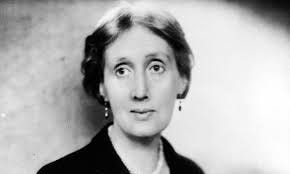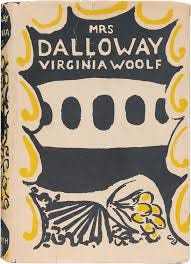It’s 100 years this week since Virginia Woolf published her novel, Mrs Dalloway.
Have you got time to read/re-read it? I hope so.
It’s best to read it in a single day. The events take place over a single day in June, 1923, beginning in the morning, in London, and ending in the evening at the grand society party Clarissa Dalloway is hosting for her husband, Richard, a dependable but rather dull politician.
What happens? Nothing much. That is, the past happens.
Time is a boomerang not at arrow.
Yet the plot method is the same as an action movie. A stranger comes to town.
In this case, not quite a stranger - an old flame of Clarissa’s. Peter Walsh, back from India. Now, the past opens up, so that the day itself, punctured by ticking clocks, stretches backwards into other days. Days when everyone in the story was young. Days when decisions were made and understood, though their consequences were not.
In a seemingly unrelated story, a shell-shocked war veteran and his Italian wife, make their way round doctors they can’t afford, hoping for a cure they will never find. The past is too powerful. The present day too flimsy in its hold on the mind.
Woolf is so good at locating the reader on the inside not the outside. If you think of art, all art, as voyeurism and eavesdropping, then the best of it takes us to the inside of the situation. We are not observers, we’re not listening in, or taking notes, we have become part of the story as it docks with something of ourselves. Not our own lived experience - that doesn’t matter - what matters is our emotional or psychological experience. Can we get at that?
Woolf’s world is not our world. It’s a 100 years ago. Woolf was an upper-class woman whose experiences are not the experiences of most of us. Does that matter? No. We are not looking for writers or artists whose biography matches our own. What is the point of that? Art isn’t a dating site or a search on Ancestry.com. We aren’t interested in a close match. Forget biography and biology.
We are interested in states of being that speak to us.
I love Woolf’s power of description. We do inhabit the exterior world as she describes it. It is visually powerfully` ‘ It was a splendid morning too. Like the pulse of a perfect heart, life struck straight through the streets’
Our real destination though is inside - and with Woolf there are many insides to explore. Insides of heart and mind, memory, confusion, regret, loss, saving face, the competing claims of success and contentment. What failure is. Peter Walsh is a failure in the eyes of the world. So is the shell-shocked Septimus Warren-Smith. But one man never cared for the judgements of the world, while the other cares too much. One man survives. One does not.
And what is it to be a woman whose success or failure will be judged by whether or not she makes a good marriage? Is that all there is? It’s a question Woolf asks and does not answer directly. We should recall that in 1925 most women in England did not have the vote - only women over 30 with some property to their name. 1928 is full female suffrage. Women could not be awarded degrees from universities on the same terms as men. Women could be legally fired from their employment on marriage. No woman could take out a loan without a male guarantor. In 1923, the year the novel is set, a new Act of Parliament finally allowed women to petition for divorce on grounds of adultery. Previously, a man might divorce his wife for having an affair, but she could not do the same to him.
I wish the new breed of right-wing female podcasters and influencers were not so wilfully ignorant about the history of women. And how recent are our gains. There is, of course, in Mrs Dalloway, the gloomy misery of Doris Kilman, the ugly academic spinster wrapped in a macintosh, tutor to Clarissa’s beautiful daughter. ‘Every man fell in love with her and she was really awfully bored.’
Miss Kilman is poor and unwanted, a lonely late-life singleton of the kind invoked by young woman online, who warn us about the consequences of being too clever, speaking your mind, and not going to the gym. Fortunately, for women now, it’s not an either/or, marriage or macintosh. Though listening to the garbage the new wave of anti-feminists are coming out with, you really might believe it’s an either/or.
Well, history tells us that in 1925 there were around 1000 women doctors registered to practice medicine in the UK. In 2025, there are around 165,000. Over 50% of GPs in the UK are female. Women’s brains haven’t changed. Society has changed.
Virginia Woolf was a first-rate feminist. She wanted equal opportunity. In her polemics, A Room of Ones Own (1929) and Three Guineas (1938) she explains what lack of opportunity does to women as individuals - how it shrinks them to a lesser version of themselves, and how this diminishment of women impoverishes the world. We need different ways of seeing and doing, different ideas, different models of leadership. That’s what women can offer. Though not if they swallow the Kool-Aid of ‘leaning in’. That is, working with what exists, not challenging it at a fundamental level. We don’t need women to be men. We need women to be woman.
And we are still very early in the history of women’s equality - not much more than 100 years. Think what we have achieved. Interesting that the push now is to rubbish that, deny the past, seal the future.
I studied English Literature at the University of Oxford. Virginia Woolf was not on the syllabus. That was in the 1980’s. I had to apply to do a special paper. That’s what happens when men make the decisions about who is worth reading (other men) and who is not (women). Things have changed - my generation and those before me were part of the change we wanted to see. I am part of the change I want to see.
I don’t want to see the likes of JD Vance and Andrew Tate, with their enthusiastic following of Orcs, itching to settle the Kingdom of Gilead here on earth. Worst and most disappointing, are the women scrambling to enable this bullshit. I guess it’s about wanting attention. The women buying into patriarchy are negative noise. It’s easy enough to re-wrap misogyny as empowerment. Harder to carve your own path, harder to study the facts.
The rest of us will stand firm on the facts. Facts are always a problem for the propaganda of the ultra-right, which is why Trump is busy trying to control the narrative in museums and universities. And now that social media pundits can make money saying anything, however unmoored from reality, fact and fiction is interchangeable. But fiction is there to help us with reality - not to help us run away from reality.
Still, I chose Mrs Dalloway this week because I wanted to write about more than the facts. I wanted to write about a work of fiction.
I said when I started these columns again, at the end of January 2025, that I feared what was most under threat from the daily bombardment on reality that the ultra-right indulges in, is not only how we live - the fabric of our lives - but our capacity to imagine how we might live. Progress depends on imagination - it depends on seeing further - not looking back to past solutions that didn’t work at the time and will never work now. History is there to guide us, but the leap is an imaginative one.
The increasing crudeness of political discourse/social media, depresses me because it lacks imagination. It’s not radical or daring or different. Yes society is a mess. That is not because women won’t stay in the home. It’s not because women want interesting lives beyond their children. It’s not because women aren’t warm-blooded ready-for-action sex-toys who are simultaneously chaste and pure, it’s not because women won’t accept that men are inherently superior. It’s not because there are too many immigrants taking ‘our’ jobs/homes/healthcare. It’s not because journalism is a lying left-wing plot against the patriarchy. It’s not because diversity is a weakness. It’s not because scientists won’t admit that climate breakdown is silly. It’s not because universities are autonomous. The list is endless. And pointless.
We need societal change at a structural level. That means affordable housing, wages that pay bills, educational opportunities for all, farming that doesn’t degrade and destroy, tax regulation that takes money from Big Tech and not from social care budgets. Oh God, you know what we need, and politicians have run the other way, allowing the ultra-right to claim the territory with their blame-game.
So, I am re-reading Mrs Dalloway. I need to keep my mind fine-tuned. I need to keep my imagination fully charged. Mrs Dalloway is a battery pack. I will lie my mind on top of it. I will come out less depleted by the bullshit. Because it is depleting, all this aggressive gaslighting bullshit. I need my energy. And so do you.
Mrs Dalloway may not be your battery pack but it is a battery pack.
Thank you, Virginia Woolf.





Thank you for writing this - I desperately needed to read this today, hours after Herr T issued the grand proclamation that he would apply a 100% tariff to movies made outside the States. My mind immediately turned to Molly Manning Walker, Raine Allen-Miller, Thea Sharrock and so many other women filmmakers. On the small screen, I wonder about Sally Wainwright, and whether or not we will even be able to access BBC here. And then I think about books by Elena Ferrante, Annie Ernaux, and yourself, and I naturally wonder/predict the tariffs that will be slapped on publishers and distributors of foreign editions (this will be next, I'm certain, even though companies like PRH/Bertelsmann are based abroad). He's a lunatic, for sure; we know this. But the women who enable him -- hiding behind their gigantic crosses, waving their T-edition "official bibles"-- are a different breed entirely, and I find myself looking for Woolfian characters who represent them. Terrible time here. I will be going back to read Mrs Dalloway again tomorrow, in one day.
Thankfully in 1993 you were on the curriculum for Eng Lit at Edinburgh Uni - I am grateful for your words.